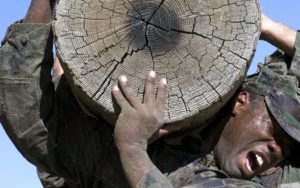Fueling Success
A Navy SEAL is a highly trained U.S. military forces member specializing in unconventional warfare, special reconnaissance, and counter-terrorism operations. Known for their exceptional physical fitness, mental toughness, and ability to operate in diverse environments, Navy SEALs undergo rigorous training to prepare for challenging missions worldwide. One phrase recruits here often during the selection process is, “Your minds will give up before your bodies do!”  A phrase that emphasizes the importance of mental resilience. I am fascinated by those who submit themselves to such challenges and wonder what motivates them. In The Molecule of More [1], Daniel Z. Lieberman and Michael E. Long explore motivation and achievement from a chemical molecular perspective. This article will first explore how dopamine is crucial in motivation and decision-making. Second, we will examine how motivation influences the development of grit and a growth mindset, drawing insights from the works of Carol Dweck[2] and Angela Duckworth[3]. Finally, we will discuss a practical step for leveraging insights from Lieberman and Long to enhance personal and professional growth.
A phrase that emphasizes the importance of mental resilience. I am fascinated by those who submit themselves to such challenges and wonder what motivates them. In The Molecule of More [1], Daniel Z. Lieberman and Michael E. Long explore motivation and achievement from a chemical molecular perspective. This article will first explore how dopamine is crucial in motivation and decision-making. Second, we will examine how motivation influences the development of grit and a growth mindset, drawing insights from the works of Carol Dweck[2] and Angela Duckworth[3]. Finally, we will discuss a practical step for leveraging insights from Lieberman and Long to enhance personal and professional growth.
Resolute Rats
In The Molecule of More, Lieberman and Long explain the function of dopamine and its connection to our desire for “more,” which fuels ambition, creativity, and the pursuit of challenging goals. In chapter three, they describe dopamine as that molecule that gives one tenacity, referring to dopamine as the “Chemical of future success.”[4] While some conclude Lieberman and Long occasionally oversimplify the complexity of brain chemistry, overestimate dopamine’s role, and downplay the influence of other neurotransmitters[5], they do make a strong case for dopamine’s significance in our pursuit and desire to achieve.
To demonstrate this, they shared a case study on “The Resolute Rats.”[6] The study showed how dopamine influences goal-directed behavior and decision-making. When researchers observed that dopamine levels in rats increased in anticipation of rewards, the rats showed a tendency to persistently engage in behaviors to achieve those rewards, highlighting the role of dopamine in influencing motivation and perseverance, even in the face of obstacles. This quality is called “tenacity” and parallels Carol Dweck’s concept of a growth mindset.
A Braid of Success
In my previous blog article, I explored the foundational elements of grit and how they affect our pursuit of success. It’s helpful to consider how these concepts are intricately connected to our motivation and desire for success. In her book Grit, Duckworth contends that “Effort counts twice” and is the factor that turns talent into success.[7] Lieberman and Long show this effort is only possible due to dopamine. They state, “The ability to put forth effort is dopaminergic. The quality of that effort can be influenced by any number of other factors, but without dopamine, there is no effort at all.”[8] So, after brushing off my trusty formal logic skills from my undergraduate philosophy days, I can now demonstrate the classic “If-then” syllogism using the insights from Lieberman, Long, and Duckworth to show:
Premise 1: If A, then B
Premise 2: If B, then C
Conclusion: If A, then C
__________________
If dopamine, then effort.
If effort, then success.
Therefore, if dopamine, then success.
However, that might be a bit reductionistic. Braiding together insights from The Molecule of More, Mindset, and Grit, we see that our motivation, resilience, and mindset shape our journeys through challenges on the way to achievement. Success can be viewed as a tapestry woven from dopamine, a growth mindset, and grit. Dopamine fuels our motivation, a growth mindset helps us embrace challenges, and grit keeps us committed to our goals. Together, these three create a strong chord of success, highlighting the connections between motivation, mindset, and resilience. By understanding these relationships, we can better navigate our journeys and unlock our potential, just like the elite warriors of the SEALs.
A Practical Step

Lieberman and Long acknowledge that motivating humans is more complicated than motivating rats. A major influence on our tenacity as humans is whether we believe we can succeed.[9] They argue that we need to believe in our capability to succeed before we can do so. We should aim to experience small wins that build our confidence and perseverance to tackle more significant challenges. Practically, we can cultivate environments and opportunities that allow us to achieve minor successes, activating the dopamine reward system and motivating us to put forth the effort and tenacity required for more significant success. Recognizing how dopamine influences behavior can enhance the practical applications of cultivating a growth mindset and grit, ultimately leading to a richer understanding of how individuals can achieve their goals and navigate challenges effectively.
_______________________________________________
[1] Daniel Z. Lieberman and Michael E. Long, The Molecule of More: How a Single Chemical in Your Brain Drives Love, Sex, and Creativity – and Will Determine the Fate of the Human Race, (Dallas, TX: BenBella Books, 2019).
[2] Carol Dweck, Mindset: Changing the Way You Think to Fulfil Your Potential, (London: Robinson, 2017).
[3] Angela Duckworth, Grit: The Power of Passion and Perseverance, (New York: Scribner, 2016).
[4] Daniel Z. Lieberman and Michael E. Long, The Molecule of More, 66.
[5] Richard E. Cytowic, “Review: The Molecule of More: How a Single Chemical in Your Brain Drives Love, Sex, and Creativity―and Will Determine the Fate of the Human Race,” accessed November 18, 2024, https://www.nyjournalofbooks.com/book-review/molecule-more.
[6] Daniel Z. Lieberman and Michael E. Long, The Molecule of More, 66-69.
[7] Angela Duckworth, Grit, 42.
[8] Daniel Z. Lieberman and Michael E. Long, The Molecule of More, 69.
[9] Ibid., 69.
9 responses to “Fueling Success”
Leave a Reply
You must be logged in to post a comment.
Brilliant Chad – make your next blog about the mighty British SAS.
How do you apply the understanding of dopamine’s role in motivation, combined with a growth mindset and grit, to overcome specific challenges or goals in your personal or ministry life?
Glyn, in my next blog article, I will focus on something significant and quintessentially British. While I may not fully understand it, I recognize the interplay between dopamine, a growth mindset, and grit. For example, I’ve noticed that my previous successes with certain decisions motivate me to make similar, yet more consequential, choices, even when faced with opposing opinions, as I pursue a specific goal.
Although I don’t have time to elaborate here, this relates to the culture I have been trying to cultivate in the congregation I began leading 18 months ago. I’ve implemented some small changes that have been successful, while others have not. Nevertheless, I feel confident about making slightly more significant adjustments, even in the face of some resistance, because I’ve learned from past failures and am motivated by previous successes and the ultimate goal.
Yes: “Dopamine fuels our motivation, a growth mindset helps us embrace challenges, and grit keeps us committed to our goals. Together, these three create a strong chord of success, highlighting the connections between motivation, mindset, and resilience.”
I tried to write the same thing though I don’t think I was as succinct as you. 😉
Where in your life do you – or have you – need to depend on this braid? Or perhaps, now that you know it and can articulate it, where in your current day or future is/will this be useful?
Debbie, thank you for your question. As you’ll see in my response to Glyn, I elaborate on a current situation that I think answers this well.
Hi Chad, thank you for your post.
Based on your post “opportunities that allow us to achieve minor successes, activating the dopamine reward system and motivating us to put forth the effort and tenacity required for more significant success”, how do you help others cultivate the mentality of celebrating minor successes.
Shela, I regularly practice this with my children, keeping in mind Carol Dweck’s insights on parenting that foster a growth mindset. When my kids experience minor successes in academics, athletics, conflict resolution, or completing chores, I make an effort to celebrate their achievements and emphasize the importance of their hard work.
Hey Chad! Thanks for this; I am a fan of the Navy Seals, keep them coming and keep Glyn waiting. (Laughing)
My multi-layered question: How can individuals or leaders intentionally design environments or practices that simultaneously cultivate dopamine-driven motivation, a growth mindset, and the resilience associated with grit to foster sustainable success and personal growth?
Daren, my interest in Navy SEALs has increased recently as my oldest son aspires and trains to serve as one. In response to your question I think of insights from Mindset:
1. Encourage Open Communication: I will foster an environment where everyone feels free to share ideas and feedback, enhancing our culture of learning.
2. Promote Ongoing Education: We are committed to supporting personal and professional development through funding opportunities.
3. Model Resilience: By sharing my experiences with setbacks and successes, I will show that challenges can lead to growth.
4. Foster Experimentation: I will support innovation and embrace the possibility of failure, encouraging new approaches and learning from them.
Hi Chad, I agree with you that small wins build on each other with also offering small boosts of dopamine. In writing and reading others’ blogs, I am starting to wonder if, as leaders, there are warning signs that we might need to pay attention to so that the dopamine hit doesn’t start to overpower the recognition of need for the effort, leaving it out and then causing needless failures. Any thoughts? This is as much a question for me as I pose for you.